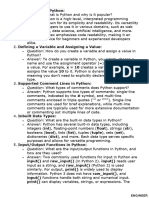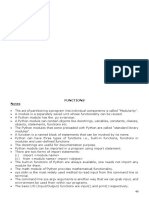0 ratings0% found this document useful (0 votes)
7 viewsComplete Python Functions Cheat Sheet
This document is a comprehensive cheat sheet for Python built-in functions, providing a list of functions along with their descriptions and examples. Key functions include print(), input(), len(), and type(), among others, each demonstrating their usage with code snippets. The document serves as a quick reference for Python developers to utilize these functions effectively.
Uploaded by
karthikeyanani2006Copyright
© © All Rights Reserved
Available Formats
Download as PDF, TXT or read online on Scribd
0 ratings0% found this document useful (0 votes)
7 viewsComplete Python Functions Cheat Sheet
This document is a comprehensive cheat sheet for Python built-in functions, providing a list of functions along with their descriptions and examples. Key functions include print(), input(), len(), and type(), among others, each demonstrating their usage with code snippets. The document serves as a quick reference for Python developers to utilize these functions effectively.
Uploaded by
karthikeyanani2006Copyright
© © All Rights Reserved
Available Formats
Download as PDF, TXT or read online on Scribd
You are on page 1/ 2
Complete Python Functions Cheat Sheet
### Built-in Functions
1. print() - Displays output on the screen.
Example: print("Hello, World!") -> Hello, World!
2. input() - Takes user input as a string.
Example: name = input("Enter your name: ")
3. len() - Returns the length of an object.
Example: len("Python") -> 6
4. type() - Returns the type of a variable.
Example: type(5.0) -> <class 'float'>
5. id() - Returns the memory address of an object.
Example: id(10)
6. isinstance() - Checks if an object is an instance of a specific class.
Example: isinstance(5, int) -> True
7. range() - Generates a sequence of numbers.
Example: list(range(1, 5)) -> [1, 2, 3, 4]
8. abs() - Returns the absolute value of a number.
Example: abs(-10) -> 10
9. round() - Rounds a number to a specified decimal places.
Example: round(3.456, 2) -> 3.46
10. pow() - Returns x raised to the power y.
Example: pow(2, 3) -> 8
11. sum() - Returns the sum of all elements in an iterable.
Example: sum([1, 2, 3]) -> 6
12. min() - Returns the smallest element in an iterable.
Example: min([4, 2, 8]) -> 2
13. max() - Returns the largest element in an iterable.
Example: max([4, 2, 8]) -> 8
14. sorted() - Returns a sorted list.
Example: sorted([3, 1, 2]) -> [1, 2, 3]
15. reversed() - Returns a reversed iterator.
Example: list(reversed([1, 2, 3])) -> [3, 2, 1]
16. enumerate() - Returns an index-value pair iterator.
Example: list(enumerate(['a', 'b'])) -> [(0, 'a'), (1, 'b')]
17. zip() - Combines multiple iterables into tuples.
Example: list(zip([1, 2], ['a', 'b'])) -> [(1, 'a'), (2, 'b')]
18. map() - Applies a function to all items in an iterable.
Example: list(map(str.upper, ["hello", "world"])) -> ['HELLO', 'WORLD']
19. filter() - Filters elements using a function.
Example: list(filter(lambda x: x % 2 == 0, [1, 2, 3, 4])) -> [2, 4]
20. lambda - Creates anonymous functions.
Example: f = lambda x: x * 2; f(5) -> 10
... (Other functions continue in the same detailed format)
You might also like
- Important (Python Built-In Methods) (CheatSheet)No ratings yetImportant (Python Built-In Methods) (CheatSheet)6 pages
- Expanded List of Additional Built-In FunctionsNo ratings yetExpanded List of Additional Built-In Functions4 pages
- 1667311140988_BULT_IN_FUNCTION_OF_PYTHONNo ratings yet1667311140988_BULT_IN_FUNCTION_OF_PYTHON2 pages
- Notes For Fintech Assesment, CheatsheetNo ratings yetNotes For Fintech Assesment, Cheatsheet19 pages
- Understanding The 10 Most Difficult Python Concepts - by Joanna - Geek CultureNo ratings yetUnderstanding The 10 Most Difficult Python Concepts - by Joanna - Geek Culture24 pages
- Comprehensive Python CheatSheet 1731972192No ratings yetComprehensive Python CheatSheet 173197219210 pages
- B13!05!06_Python_Collection Data Types and StringNo ratings yetB13!05!06_Python_Collection Data Types and String83 pages
- Lecture 3 Python Multivalue Data Types Functions - Hadi - UpdatedNo ratings yetLecture 3 Python Multivalue Data Types Functions - Hadi - Updated52 pages



























































